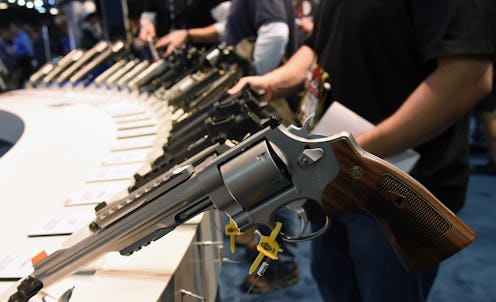The death of Alton Sterling, who died of multiple gunshot wounds on Tuesday outside of the Triple S Food Mart in Baton Rouge, has warranted a look into Louisiana's gun laws. Similar to those of most southern conservative states, they're some of the most lenient in the nation. According to a call received by Baton Rouge police, Sterling had allegedly threatened a man with a gun before being shot by police who arrived moments later. Though Sterling was carrying a firearm at the time, Triple S Food Mart owner Abdullah Muflahi told CNN that he had never seen Sterling instigate an altercation with anyone, and a new video reportedly showed that Sterling did not have a gun in his hand. However, the Baton Rouge Police Department said their officers believed the shooting was justified.
In 2015, the Brady Campaign, an organization committed to preventing gun violence, gave Louisiana a score of -27 out of 100, making it the fourth friendliest state toward guns behind Wyoming, Alaska, and Arizona. And according to WorldAtlas.com, it was also ranked the sixth most dangerous state in 2015. That same year, Mother Jones calculated that guns were present inside of 40 to 50 percent of households in the state.
There are a lot of things that Louisiana doesn't require of gun purchasers, according to the Law Center to Prevent Gun Violence. If a Louisiana resident wants to purchase a gun, for example, he or she only needs to present a driver's license to prove age. No background checks or gun permits are needed if the buyer doesn't plan on carrying it in public. Furthermore, gun dealers can sell firearms with no license and are not required to keep a record of what they sell to whom. Additionally, residents over the age of 21 can buy as many firearms as they please, even in the same day. Lastly, there is currently no regulations imposed on high capacity magazines, ammunition, or guns in the workplace.
Obtaining a concealed weapon permit, however, is slightly more difficult. If a resident wishes to carry a loaded weapon, he or she must undergo a background check and have an entirely clean record. A training course and safety class are also required.
Unlike recent mass shooting cases, the point in question is not Sterling's alleged possession of a firearm. Instead, the Department of Justice's civil rights division is investigating the police officers' indiscretion. Though gun laws don't as heavily affect officers who are already licensed to carry firearms on the job, the prevalence of guns in the state could latently encourage authority to act in a certain manner toward suspects that might be carrying.
